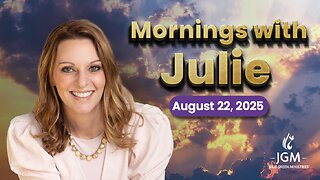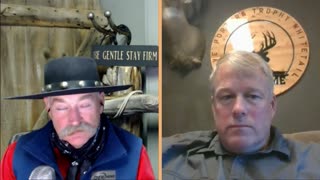Premium Only Content
![[Laborem Exercens] Section 3 - Conflict between Labor & Capital in the Present Phase of History](https://1a-1791.com/video/s8/6/f/Q/9/6/fQ96e.OvCc.jpg)
[Laborem Exercens] Section 3 - Conflict between Labor & Capital in the Present Phase of History
Follow the Full Series Here:
[Laborem Exercens] Chapter 1 Introdcution- https://tinyurl.com/2p9xyesy
[Laborem Exercens] Chapter 2 Work & Man- https://tinyurl.com/4sb6swz3
[Laborem Exercens] Chapter 3 Conflict of Capital & Labor- https://tinyurl.com/5n6k7t8u
[Laborem Exercens] Chapter 4 Rights of Workers- https://tinyurl.com/5achk4hz
[Laborem Exercens] Chapter 5 Spirituality of Work- https://tinyurl.com/347bfbem
An audio presentation of the third section of Pope St. John-Paul II 1981 Encyclical Laborem Exercens: On Human Work commemorating the 90th anniversary of Leo XIII's Rerum Novarum.
Section Three is where John-Paul II lays out his Philosophical Critique of both Marxism and Capitalism. While recognizing that Marxism (and it’s modern manifestations in various Critical Theories), accurately identifies points of conflict in society, its solutions are lacking. Philosophically, it is devoid of the deeper reality of the human spirit being made in the image and likeness of God, which is precisely the same problem with its counter-part Capitalism. Both economic theories, and now social ideologies, are based exclusively on materialism. Both systems will end up deconstructing the human person into just another object of production. This is the core problem of both economic systems: they subordinate the human person into an object, a tool of production, to be used by either the Corporation or the State. The main difference between Capitalism and Marxism is procedural: IE did you vote to be enslaved to material interest, or was it imposed upon you?
John-Paul II reminds us of the beauty and dignity of work. The Human person “an object which is a definite subject…” (From Love and Responsibility) is changed by his work because of how he integrates his subjective experience of working. Work can build us up and inform us of our dignity as beloved children of God. Even though we toil, if such work itself is dignified, it builds our character and makes us better people. John-Paul II connects capital back to people, because it is ultimately from human labor that all capital comes. Capital is the work of people over time. It is a congregating reservoir of advancements build upon advancements. Technology and progress are shared products of human ingenuity throughout the ages.
Finally, John-Paul II reminds us of the Universal Destination of Goods. That all production is oriented toward the good of all. As his predecessors said, and his successors will continue to affirm, we do not have a universal right to property. We have a right to property to the extent that we secure our lives and provide for those that by duty and love we are bound to support. Beyond those basic needs, our wealth and property belong to those who lack the basics to live. (See St John Chrysostom on the right to ownership of property).
00:00 - 06:01 - 11. Dimensions of the Conflict
06:02 - 12:26 - 12. The Priority of Labor
08:47 - 09:18 - The Guiding Thread of this Document
12:27 - 20:17 - 13. Economism and Materialism
20:18 - 29:12 - 14. Work and Opportunity
29:13 - 32:24 - 15. The "Personalist" Argument
-
 LIVE
LIVE
LFA TV
5 hours agoLFA TV ALL DAY STREAM - FRIDAY 8/22/25
18,399 watching -
 1:01:29
1:01:29
JULIE GREEN MINISTRIES
2 hours agoMARTIAL LAW IS COMING
31.5K111 -

Game On!
17 hours ago $1.28 earnedNFL Preseason Week 3 Preview and Best Bets!
21.3K1 -
 LIVE
LIVE
JuicyJohns
50 minutes ago🟢#1 REBIRTH PLAYER 10.2+ KD🟢
95 watching -
 30:53
30:53
Clickbait Wasteland
15 hours ago $2.18 earnedAsking New Yorkers Who They Support For Mayor: Jackson Heights
22.4K12 -
 23:05
23:05
Blackstone Griddles
15 hours agoEpisode 6 | Breakfast, Lunch, and Dinner
13.1K -
 1:12:00
1:12:00
The Car Guy Online
14 hours ago $1.63 earnedAutomakers EXPOSED, Whistleblowers SILENCED! NextGen Engineer Speaks Out!
12.5K6 -
 1:17
1:17
The Lou Holtz Show
15 hours agoThe Lou Holtz Show S2 EP16 | Hugh Freeze on Faith, Football & Restoring American Values #podcast
11.5K2 -

BEK TV
1 day agoTrent Loos in the Morning - 8/22/2025
10.3K -
 LIVE
LIVE
The Bubba Army
23 hours agoHogan's Death: Bubba Called it FIRST AGAIN! - Bubba the Love Sponge® Show | 8/22/25
2,166 watching